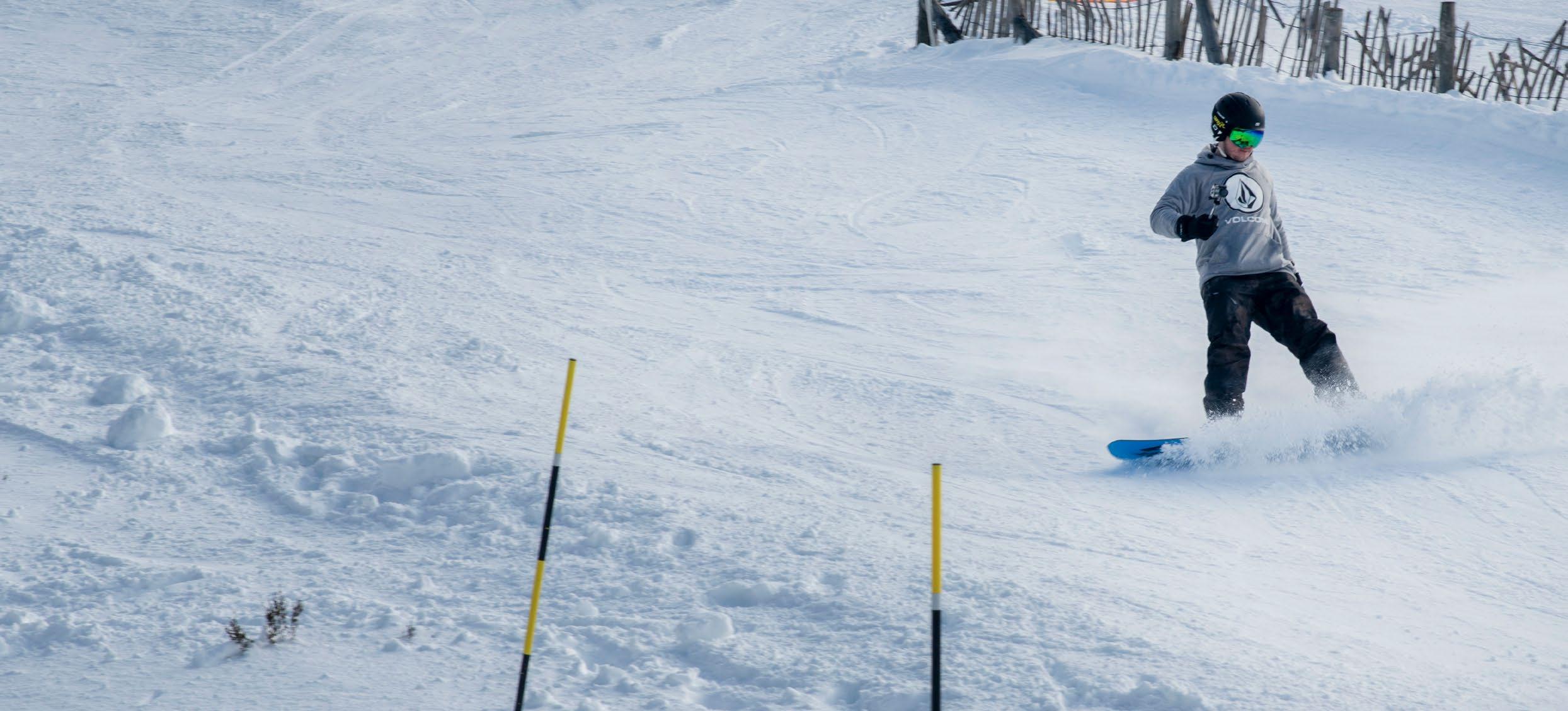
13 minute read
Tourism industry maps out new routes to recovery
Tourism is vital to the Highlands and Islands and will play a key role in our post-pandemic economic recovery. As providers adapt to a changing market, HIE has started to deliver both immediate and long-term support.
From travel bans and local lockdowns to implementing track and trace systems and social distancing, businesses in the tourism industry have faced unprecedented challenges this year. With support from HIE and our partners, many businesses are using this enforced interruption to re-imagine a more sustainable future.
Advertisement
DELIVERING FUNDING TO THE FRONT LINE
As coronavirus restrictions tightened into full national lockdown in March, HIE played a key role in helping tourism businesses in the region access emergency support.
Tourism and hospitality providers accounted for a significant number of organisations that made successful applications for emergency funds administered by HIE on behalf of the Scottish Government.
The Pivotal Enterprise Resilience Fund (PERF), administered by Scotland’s enterprise agencies, provided grants to small and medium sized companies who were able to demonstrate a viable contribution to Scotland’s local or national economy if they could be supported to keep trading in the short term. In the Highlands and Islands, the tourism and hospitality sector accounted for 43% of PERF awards, compared with 11% nationally.
The £30m Creative, Tourism and Hospitality Enterprises Hardship Fund meanwhile provided grants of up to £25,000 for small creative, tourism and hospitality companies not in receipt of COVD-19 business rates relief. In the Highlands and Islands, a total of 456 grants were awarded totalling £4.9m. HIE is also providing targeted support to selected hotels across the region through the £14m Hotel Support Programme. Through bespoke consultancy, business advice and funding, this national programme protects sustainable employment in larger hotels that are most impacted by the temporary downturn in travel.
PRACTICAL SUPPORT
In addition to administering emergency funds, HIE were quick to launch a new Tune Into Tourism (TINTO) podcast series to make sure local businesses had access to the latest developments, international research and innovative thinking in the tourism sector.
“We changed from the webinars we offered last year to podcasts,” explains Seb Shingler, tourism development manager for the Northern Innovation Hub.
“Partly because it was easier to arrange guests while respecting social distancing, but also to avoid contributing to Zoom burnout for our audience! It was a stressful time, so we were keen to remind operators to look after themselves as well as their businesses. We encouraged them to step away from their desk and take a break while listening to the podcast for inspiration, ideally while going for a walk or enjoying some fresh air.”
Eight new episodes were released on all major podcast platforms across the spring and summer, with more due to follow later in 2020. As well as regular updates from VisitScotland’s market news and consumer insight reports, host Julia Sutherland spoke to influential figures from both the domestic and international tourism industries. Listeners heard inspirational stories and practical tips on how providers of all kinds are responding to the changing market.
Noted travel journalist Simon Calder featured on two episodes, highlighting the opportunity for increased domestic travel to offset lost business from international guests as well as the need for providers to reassure local communities, employees and potential guests that all necessary COVID precautions are in place.
Along with our partners, HIE helped implement a number of initiatives to help the industry re-open as restrictions eased, including VisitScotland’s Get Tourism Ready campaign and the Good To Go self-certification scheme which helped operators demonstrate compliance with the latest health and safety guidance.
NEW STORIES, NEW ADVENTURES

Gavin and Penny Ellis, owners of The Knockomie Inn in Forres, found the Good To Go scheme invaluable as they prepared to re-open after lockdown. As well as identifying ways to minimise risk, such as the removal of various items from guest rooms and PPE requirements for the housekeeping team, they found the accreditation a useful way to build confidence among prospective guests before they even make a booking.
Gavin and Penny are among those impacted by the significant drop off in international tourism. By May 2020, experts were predicting a 60-80% reduction in international visitors to Scotland this year. Echoing Simon Calder’s conversations on the TINTO podcasts, however, Gavin believes there is significant opportunity to replace this lost revenue by an increasing focus on the domestic tourism market.
UK travellers accounted for 80% of Scotland’s pre-COVID overnight stays, and Gavin believes the challenge now is to better promote the attractions on offer to tempt those visitors into booking longer visits.
Knockomie has already played host to UK guests who had travelled to bike the Glenlivet Trails, and Gavin also pivoted his marketing to tempt golfers to Scotland’s coastal courses as a replacement for cancelled trips to Spain.
The key lies in highlighting the unique attractions and facilities the region has to offer and sharing them with the right domestic audiences.
“There’s so much to look forward to,” says Gavin, “so if we tell the right stories and promote the right interests to photographers, to golfers, to wildlife watchers, to walkers, then we will survive.”
Penny and Gavin Ellis, Knockomie Inn, Forres
ONGOING SUPPORT FOR STRATEGIC RECOVERY
HIE remains fully engaged in supporting the long-term recovery of the sector, with a new £3m investment in the local Destination Management Organisations (DMOs) which are so critical in developing local tourism economies.
With DMOs able to tailor their activities specifically to local needs and strengths, they provide a valuable boost to the profile, profitability and collaboration opportunities of individual areas and the businesses within them.
DMOs have recently played a vital role in co-ordinating local re-opening plans and providing clarity on government guidance, and with HIE’s support, will help communities across the Highlands and Islands harness the benefits of strategic tourism recovery in the coming months and years.
Community representatives are set to play a bigger role in shaping the future of local tourism economies across the region thanks to the ground-breaking ‘Communities Leading in Tourism’ programme developed by HIE and South of Scotland Enterprise (SOSE).
A second of three planned intakes of representatives from relevant community development organisations and social enterprises are now engaged in the programme, which aims to foster the industry understanding and leadership skills that will drive a sustainable future for the tourism sector.
The programme recognises the increasing role of local communities in managing and developing the opportunity that tourism brings to their areas, which is more relevant than ever as the sector adapts to a significantly changed travel landscape.
“As we tackle the impacts of COVID-19 in rural Scotland, community leadership is more important than ever. Engaging communities is an essential part of developing sustainable tourism going forward,”
explains HIE’s director of Communities and Place Douglas Cowan.
OUTLOOK FOR THE FUTURE
Scotland Outlook 2030, the country’s long-term tourism strategy, lays out a vision of ‘responsible tourism for a sustainable future’. Responsible use of our abundant natural resources will be required to ensure they are protected for local communities as well as our vital domestic and international guests.
With the region’s wealth of open spaces, varied landscapes and unique visitor experiences, tourism operators in the region are well placed to balance sustainable, community-led provision with the growing demand for outdoor and adventure tourism.
Covering a range of activities from white knuckle river rafting to sedate days spent foraging for the freshest of produce, adventure and outdoor activities are expected to be even more in demand in the future. Guests are now attempting to combine vital social distancing with longed-for new experiences and time in open spaces following months of lockdown.
HIE’s Northern Innovation Hub’s Let’s Grow Adventure Tourism programme provides coaching and mentorship to businesses in the Highland Council region who are directly involved in the delivery of adventure tourism.
Through specialist workshops, one-to-one support and a new community of like-minded local businesses, 50 adventure tourism operators across five cohorts will discover new ways to capitalise on this expanding travel sector.
While challenges undoubtedly remain as the industry navigates uncharted waters, HIE will continue to support tourism providers and the enormous contribution they make to the Highlands and Islands.
FIND OUT MORE
GoodToGoScotland.com
hie.co.uk/KnockomieInn
hie.co.uk/adventure-tourism VisitScotland.org
RESILIENCE IS KEY TO RECOVERY ANNA MILLER
HEAD OF TOURISM AT HIE, REFLECTS ON THE INDUSTRY’S DETERMINATION TO MOVE FORWARD.
This year has been one of the toughest our tourism sector has ever faced, surpassing even the widespread and devastating impacts of the foot and mouth outbreak in 2001.
As much as the economic impact has been huge, I think it’s fair to say the personal impact on many within the industry has been just as devastating. From long-owned family businesses to new ventures, many providers have faced a complete loss of income and been unable to make firm plans for recovery. Despite this continuing uncertainty, we’ve seen providers pivot to new business models in record time, DMOs support local operators with guidance and interpretation of changing guidelines, and individuals come together for collaboration and support.
I’ve been attending the Scottish Tourism Emergency Response Group (STERG), where HIE, our partners and the Scottish Government have heard directly from industry representatives about the ever-evolving challenges they’re facing. We’ve heard how varied the impacts of the pandemic have been across different parts of the sector and how providers are responding to changing guidance on how they must operate. We’ve listened to these issues and used them to inform the support we have on offer, and we’re in constant dialogue with the Scottish Government and other agencies to ensure the voice of the Highlands and Islands tourism sector is heard.
From our on the ground account managers to those working at sector level, we’ve been struck by the passion and resilience of people across the industry. In the most challenging circumstances, they’ve remained determined to provide fantastic visitor experiences, and feedback shows they’ve been succeeding. As we work together on a long-term recovery, the ambitions for ‘responsible tourism for a sustainable future’ within Scotland’s 2030 tourism strategy are more relevant than ever.
HIE will be here to support the tourism industry every step of the way, and I take my hat off to all those working so hard to steer the sector to a brighter future.
WHY I LOVE RUNNING MY BUSINESS IN THE HIGHLANDS AND ISLANDS… IONA MCLACHLAN
Surf instructor and co-founder of North Coast Watersports
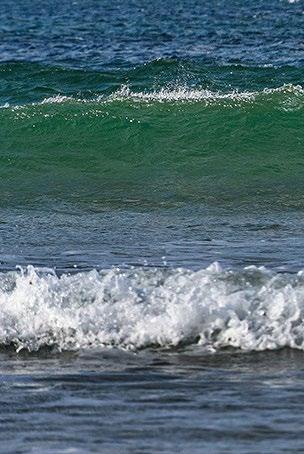
Iona McLachlan and Finn MacDonald set up North Coast Watersports in the spring of 2019, following eight months of travelling and surfing around the world. Originally from Thurso, Iona is the current Scottish Ladies Surf Champion. Offering surf lessons, paddle boarding, equipment hire and ‘SWELL Weekend’ surf retreats, Iona and Finn are catering to an ever-growing market of locals and visitors.

WHY IS NORTH COAST WATERSPORTS BASED IN CAITHNESS?
For surfing, I can honestly say that the Caithness coast is an equal contender to the likes of Hawaii and Australia. I started writing our business plan while working at a surf school in New Zealand. I think I was missing home a little, and I could see that there was enormous potential for a surf school on Scotland’s north coast. It’s got the waves and beaches, but doesn’t have the crowds that you find in other parts of the world. We won a grant from the Caithness Business Fund to buy our equipment and started from there.
WHAT DO YOU LIKE BEST ABOUT RUNNING YOUR BUSINESS IN CAITHNESS?
I grew up in Caithness, but the wild beauty of the place never fails to impress. There’s a lovely, close-knit community of surfers here, supported by the local surf club. I’ve run a few after-school surf lessons with local primary school children, and in the future I’d love to get surfing on to Thurso High School’s PE curriculum. We’re at such an exciting stage; I really do feel like anything is possible.

Finn MacDonald and Iona McLachlan, North Coast Watersports
WHAT CHALLENGES DOES YOUR LOCATION PRESENT AND HOW HAVE YOU OVERCOME THEM?
Our business is entirely reliant on weather conditions, and Scotland isn’t exactly known for its consistent and predictable weather. We need to be flexible, and I’ll often have to change plans last minute. The cold also puts some people off; they don’t believe that you can comfortably surf this far north. But with a five-millimetre wetsuit, plus hood, booties and gloves, you’re good to go!
HOW HAS HIE SUPPORTED YOUR BUSINESS TO THRIVE IN CAITHNESS?
Finn and I were totally new to the world of business. HIE has been really supportive in helping us find our feet. We’ve got a great relationship with our account manager Keith, who knows the area and knows our business. He phones us every week to check how we’re doing. We’ve also attended finance and social media workshops, and worked with a digital consultant to help raise our online profile. During lockdown, we also received financial support through the Creative, Tourism and Hospitality Enterprises Hardship Fund, which enabled us to safeguard our position, guarantee our survival through the winter season, and keep our hire equipment topped up and in good repair. We were also able to buy a drone, which has helped us get some amazing promotional photos and videos for our website and social media.
HOW HAS COVID-19 AFFECTED YOUR BUSINESS?
Lockdown actually gave us valuable time to get certain aspects of the business up to speed. We created a new online booking system, which replaced our less advanced pencil and paper method! It’s also given us time to think about the future. We’d like to operate from other locations along the coast, provide accommodation, and offer more activities, such as kayaking and yoga. Since lessons resumed in June, we’ve been incredibly busy. I’ve had two days off in three months – the two days when there were no waves!

WALK US THROUGH YOUR IDEAL WORK DAY…
I’ll wake up to sun, and perfect learner waves down at Dunnet Beach, before taking a group of beginners out. The lesson will be lots of fun, and everyone will leave with a newfound love for surfing. After an afternoon class, I’ll head out myself, and hope to see some dolphins in the bay. Maybe Finn will have gone free diving after work, and if we’re lucky, he’ll have caught a lobster. It’s hard physical work being out in the water every day, so good food is very important!
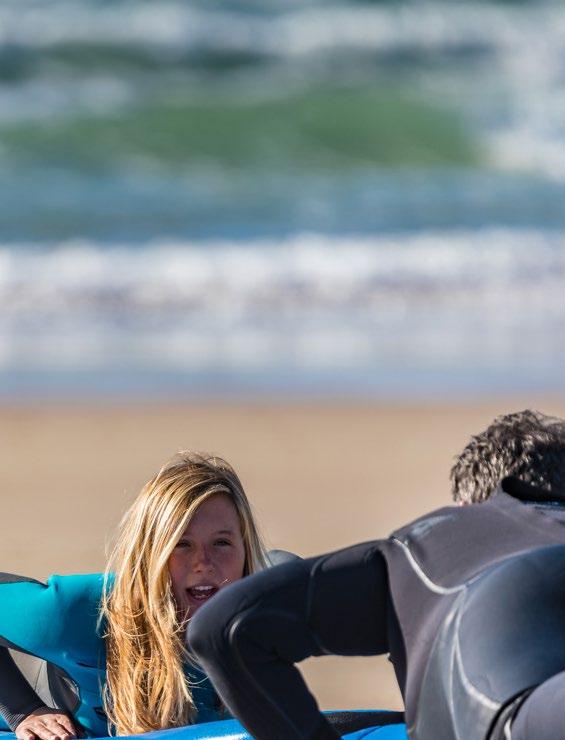
CAN YOU TELL US IN THREE WORDS WHY YOU LOVE RUNNING YOUR BUSINESS IN THE HIGHLANDS AND ISLANDS?
Potential. Lifestyle. Wild.
HIE FOCUS MAGAZINE SIGN UP TO RECEIVE YOUR FREE COPY

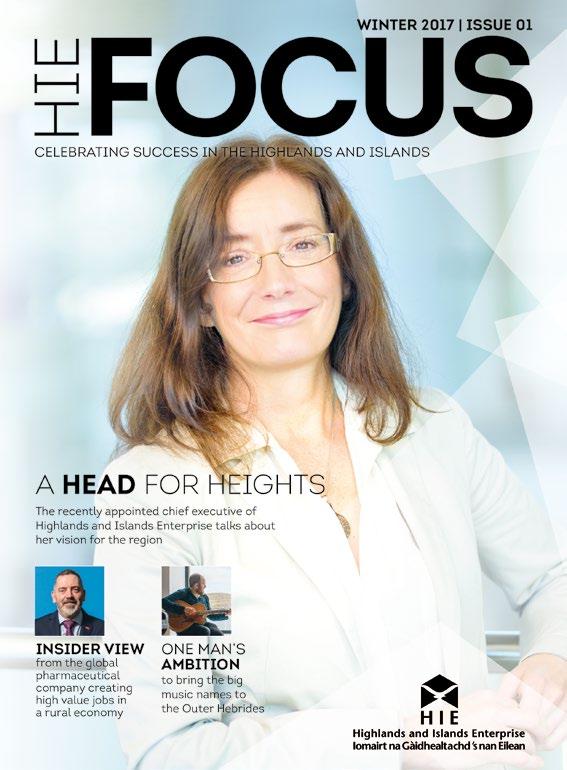
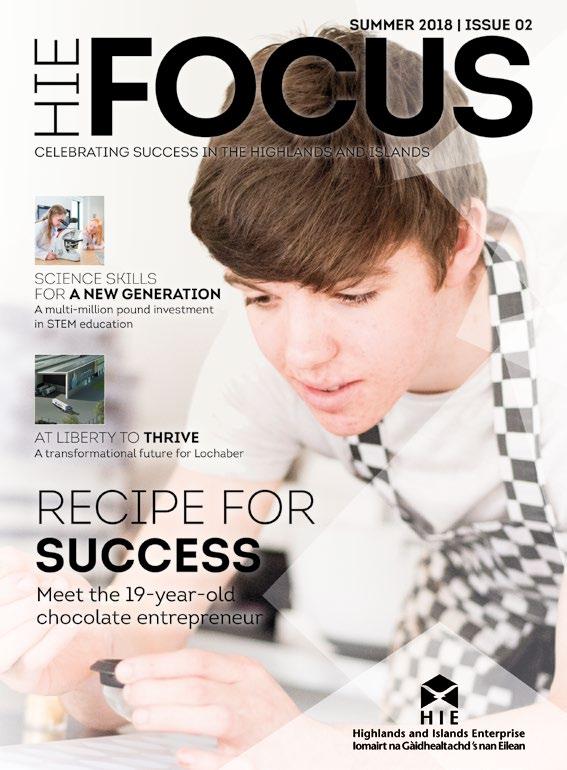
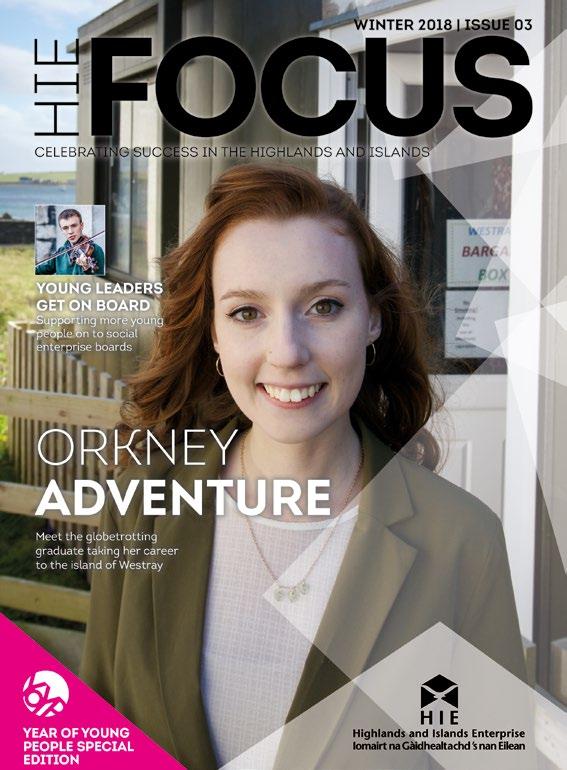


Full of stories from across the Highlands and Islands, FOCUS is a twice-yearly magazine that showcases the people and organisations that make this such an exciting place to live, work, study and invest.









